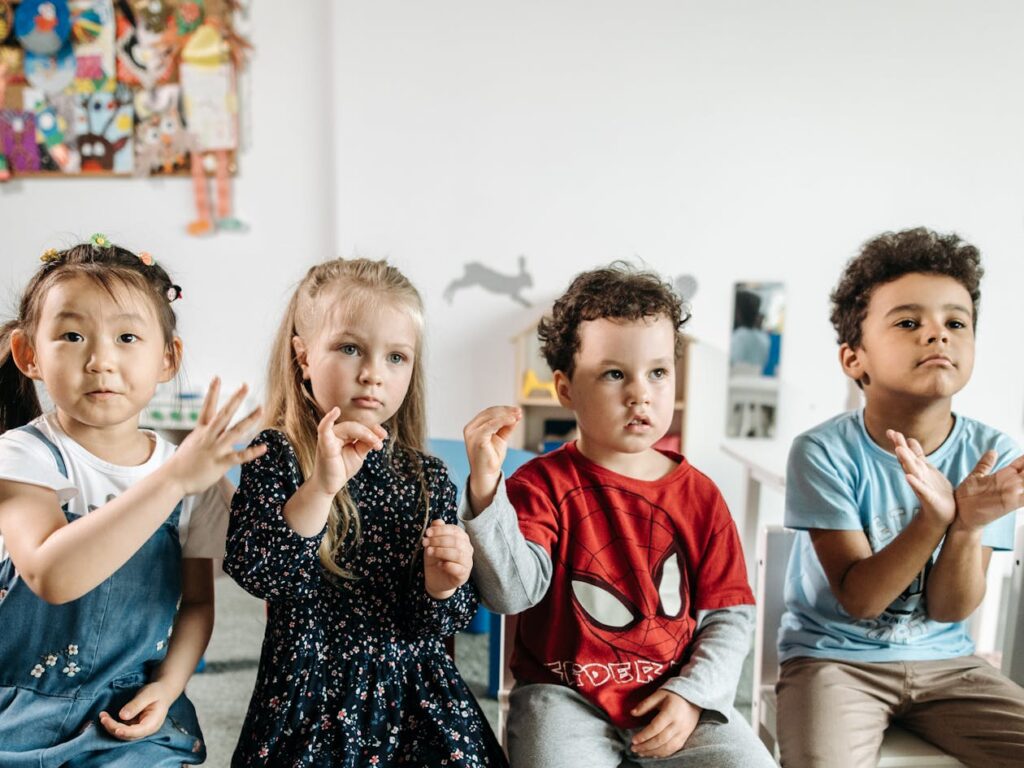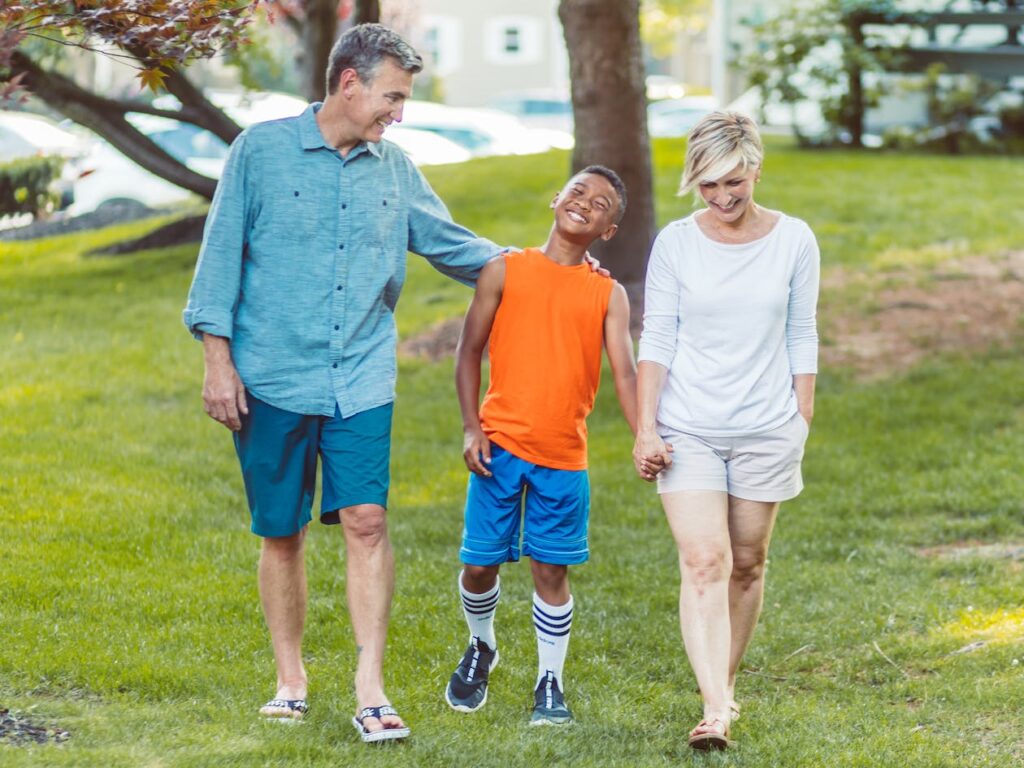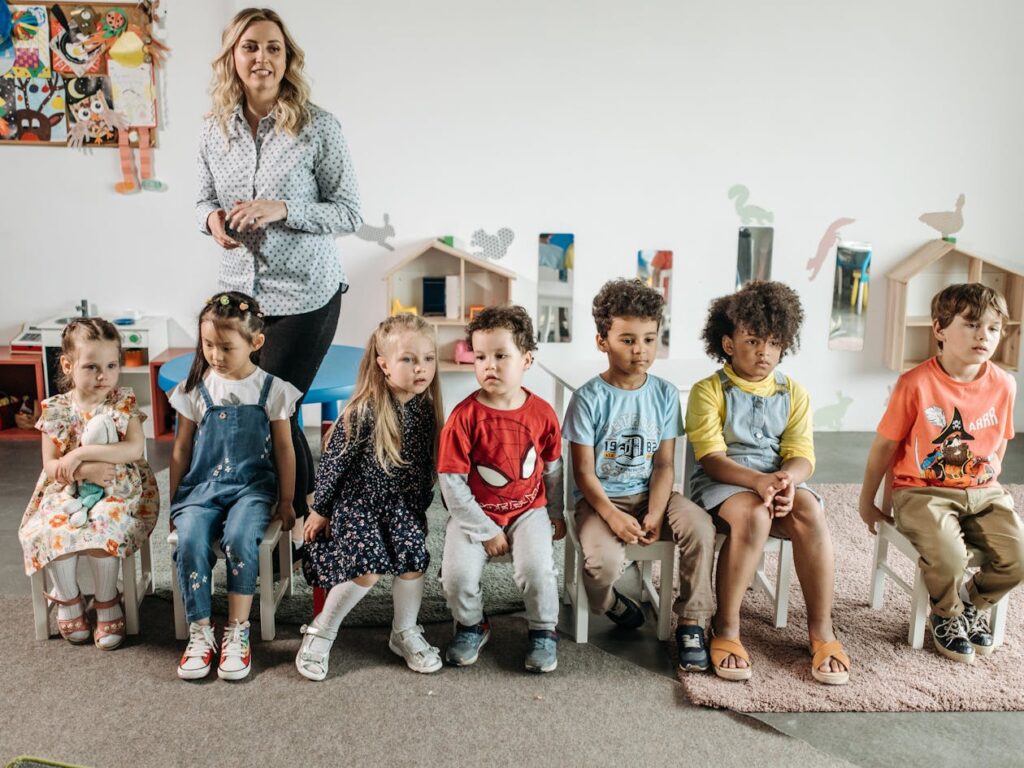Watch – A 5-Year-Old Boy Invites His Entire Class to Watch Him Get Adopted

Twenty-three kindergarteners filed into Judge Patricia Gardner’s courtroom on a Thursday morning in December. They carried paper hearts glued to popsicle sticks, waving them like tiny flags of love. A Christmas necklace sparkled around the judge’s neck. Santa Claus waited in the hallway.
No crime had been committed. No dispute needed settling. Instead, something extraordinary was about to unfold in Kent County, Michigan. A five-year-old boy named Michael Orlando Clark Jr. had decided his classmates needed front-row seats to watch his life change forever.
Courtrooms rarely echo with children’s laughter. Judges seldom wear holiday decorations. But December 5, 2019, broke all the rules. Michael sat in an adult-sized chair that swallowed his small frame, his feet dangling above the floor. His parents flanked him. Behind them, his entire kindergarten class stood ready to witness something most adults never see: the exact moment a child legally becomes someone’s son.
Twenty-Three Kids Waving Paper Hearts in a Courtroom
Picture a typical courtroom scene, then forget everything you imagined. Replace the usual tension with excitement. Swap adult faces for five-year-old grins. Trade briefcases for backpacks. Judge Gardner’s courtroom had transformed into something between a classroom and a celebration hall.
Michael’s classmates didn’t just show up. They showed up prepared. Each child clutched a heart-shaped sign, ready to wave it at the perfect moment. Some hearts bore messages. Others simply existed as symbols of support. Red, pink, purple hearts bobbing on sticks, held by small hands that understood something profound was happening to their friend.
Judge Gardner herself had dressed for the occasion. Her Christmas necklace sent a clear message: today wasn’t about stern justice. Today was about joy. About family. About a little boy who’d waited long enough for his forever home.
Kent County courthouse staff had seen adoption days before. Twenty-three years of them, actually. But they’d never seen anything quite like Michael’s kindergarten invasion. Security guards smiled instead of scowling. Clerks peeked around corners to catch glimpses. Even seasoned court reporters found themselves blinking back tears.
Meet Michael: The Boy Who Packed the Courtroom
Michael Orlando Clark Jr. understood something many adults forget: big moments deserve big audiences. When you’re five years old and finally getting adopted, why keep it quiet? Why not invite everyone who matters?
His journey to this courtroom had been longer than his five years might suggest. Foster care. Uncertainty. Waiting. But now, sitting between the two people who chose him, who fought for him, who would become his legal parents in mere minutes, Michael radiated pure happiness.
“I love my daddy so much,” he would tell a local news reporter, his voice bursting with excitement that couldn’t be contained.
Most children getting adopted might feel nervous about the attention. Michael felt differently. He wanted witnesses. He wanted his friends to understand that families form in different ways. He wanted them to be part of his story, not just hear about it later during show-and-tell.
His invitation to his classmates wasn’t just about having an audience. It was about normalizing adoption, about showing that becoming a family is something to celebrate openly, not whisper about in hallways.
When Your Classroom Becomes Your Crew
Probably the cutest story you will ever see. A kid who’s being adopted invited his ENTIRE kindergarten class to attend his adoption. @wzzm13 pic.twitter.com/tb9WC4tjVO
— James Starks II (@_JamesStarks) December 5, 2019
Michael’s kindergarten teacher understood something fundamental about childhood. Five-year-olds don’t compartmentalize love. They don’t separate school friends from real friends. When you’re five, your classroom is your world, and your classmates are your people.
“Family doesn’t have to be DNA, because family is support and love,” she told Judge Gardner, her voice carrying across the courtroom.
Since September, she’d built more than reading skills and number recognition. She’d built a community of five-year-olds who looked out for each other. Michael wasn’t just a student in her class. He was part of their kindergarten family, and families show up for each other’s big moments.
Teaching empathy can’t happen through worksheets. It happens through experiences like this, where children learn that love means presence. Support means showing up. Family means choosing to be there when someone needs you.
Her students didn’t need a permission slip for a field trip. They needed permission to love their classmate publicly, loudly, with paper hearts held high and voices that wouldn’t whisper their support.
Roll Call for Love: Every Kid Had Something to Say

One by one, twenty-three kindergarteners stepped forward. Each child stated their name clearly, then explained to Judge Gardner why they’d come. No coaching needed. No scripts provided. Just five-year-olds speaking truth in the simplest way possible.
“Michael is my best friend,” announced Steven, his voice small but certain in the big courtroom.
Another child named Lily stood up straight, looked directly at the judge, and declared her position on the matter. She loved Michael. That’s why she was there. Case closed.
Every single classmate took their turn. Some spoke loudly. Others whispered. A few giggled nervously. But each one made their presence known, their support official. Judge Gardner listened to every introduction, every declaration, every five-year-old’s testimony about why Michael mattered.
Adults often struggle to find the right words for big moments. Kindergarteners don’t have that problem. They say what they feel. Michael is our friend. We love him. We came to watch him get his family. Simple truths that cut through legal formality straight to the heart of what was happening.
Bang That Gavel: Making It Official
Judge Gardner invited Michael and his parents to join her behind the bench. Three people who would leave as a legal family stood where justice usually gets dispensed. But today, justice looked different. Justice looked like a five-year-old finally getting permanence.
Michael’s small hand joined his parents’ hands on the gavel. Together, they raised it. Together, they brought it down. Bang. Official. Legal. Forever.
Cheers erupted from twenty-three small throats. Paper hearts waved frantically. Teachers wiped their eyes. Parents in the gallery reached for tissues. Even court staff, who’d seen hundreds of adoptions, felt this one differently.
No dry eyes remained in Judge Gardner’s courtroom. How could there be? A little boy who’d waited for a family had just gotten one, and his entire kindergarten class had witnessed the exact moment it became real.
Michael’s grin stretched impossibly wide. His feet kicked with excitement in that too-big chair. His parents held him close, their own emotions barely contained. Behind them, his classmates celebrated like their team had just won the championship. Because in a way, they had.
Adoption Day: 37 Kids Finding Home

Michael wasn’t alone in finding his forever family that day. Kent County’s 23rd annual Adoption Day saw thirty-seven children officially join their families. Each family got thirty minutes in court, time to celebrate with their own supporters, their own witnesses to their new beginning.
Santa Claus himself took time from his December schedule to appear. Not the mall Santa. Not someone’s uncle in a red suit. But Santa, as far as the kids were concerned, showing up for children who’d been extra good, who’d been patient, who’d earned the ultimate gift: parents who chose them.
Support organizations filled the courthouse. Adoptive Family Support Network representatives stood ready with resources. CASA volunteers who’d advocated for these children through their journeys watched their work reach its happiest conclusion. Police officers from the Grand Rapids department brought therapy dogs. Kent County Sheriff’s K-9 unit made appearances. Teddy bears got distributed by Hug-A-Bear volunteers.
Every detail had been planned to make the day feel less like court and more like celebration. Because that’s what adoption day should be: a celebration of families forming, of children finding safety, of love becoming legal.
Family Doesn’t Need DNA

Michael’s teacher had spoken truth that resonated beyond the courtroom walls. Her words about family being support and love, not DNA, captured something our culture often forgets. Family is who shows up. Family is who stays. Family is who celebrates your victories and stands with you through struggles.
Twenty-three kindergarteners understood this instinctively. They didn’t need lessons about adoption, about foster care, about the legal system. They just knew their friend was getting something important, something worth missing regular class to witness.
Michael’s openness about his adoption sent ripples through his classroom community. Other children in foster care saw that adoption wasn’t shameful, wasn’t secret, wasn’t something to hide. Children with biological families learned that families form in many ways, all of them valid, all of them real.
By inviting his class, Michael and his parents chose radical transparency. They refused to treat adoption like a whispered secret or a private shame. They threw open the doors and said: watch us become a family. Celebrate with us. Be part of our story.
Judge Gardner’s Christmas Necklace Says It All
Details matter when you’re five. Judge Gardner understood this. Her Christmas necklace wasn’t just jewelry; it was a signal. Courts don’t have to be scary. Judges don’t have to be intimidating. Sometimes, the law wraps itself in holiday decorations and speaks gently to kindergarteners about love.
She’d overseen hundreds of adoptions in her career. She understood the weight of these moments, the long journeys that led families to her courtroom. Some children had waited years. Some had moved through multiple placements. Some had experienced trauma no child should know.
“Sometimes their journeys have been very long,” Gardner would later reflect. These journeys included miracles and changes, struggle and triumph. But they all led here, to this moment, to this courtroom where law transformed into love.
Making the courthouse feel welcoming for children took intention. It took judges willing to wear Christmas necklaces in December. It took staff who understood that adoption day wasn’t just another docket to clear. It took a system choosing to celebrate rather than simply process.
What These Kids Will Remember Twenty Years Later

Two decades from now, Michael’s kindergarten classmates will remember this day. Not the math lessons they missed. Not the spelling test that got postponed. They’ll remember standing in a real courtroom, holding paper hearts, watching their friend become someone’s official son.
They’ll remember that love sometimes requires witnesses. That supporting friends means showing up, even when it means taking a field trip to the courthouse. That families form through choice as much as chance.
Michael will remember having an army behind him. Twenty-three five-year-olds who thought his adoption was worth celebrating. Who didn’t see his journey through foster care as something to pity but his joining a family as something to cheer.
His parents will remember choosing to share this intimate moment with two dozen kindergarteners. They’ll remember the sound of small voices telling a judge why they loved their son. They’ll remember paper hearts waving like victory flags when the gavel came down.
Why This Story Traveled Around the World
Michael’s classmates supporting his adoption. @wzzm13 pic.twitter.com/4wUFiE9bAC
— James Starks II (@_JamesStarks) December 5, 2019
Kent County’s Facebook post about Michael’s adoption went viral within hours. The photo of him in that oversized chair, his classmates behind him with their paper hearts, touched something universal. Comments poured in from around the globe. News outlets picked up the story. Social media exploded with heart emojis and crying faces.
Why did this story resonate so deeply? Perhaps because it reminded us that goodness exists. That communities can rally around vulnerable children. That five-year-olds understand love better than most adults. That sometimes, the system gets it right.
In a news cycle dominated by division and disaster, Michael’s story offered something different. Hope. Joy. Proof that humans are capable of beautiful things. Evidence that children, given the chance, will choose love every single time.
Adoption often hides in shadows, wrapped in privacy and complicated emotions. Michael’s public celebration dragged it into the light, decorated it with paper hearts, and announced to the world: this is what family looks like. This is what support looks like. This is what happens when we show up for each other.
December 5, 2019, in Kent County, Michigan. Thirty-seven children found their forever families. One five-year-old boy invited his entire kindergarten class to witness his adoption. Twenty-three children learned that family doesn’t require DNA, just support and love. A judge wore a Christmas necklace. Santa showed up. Hearts got waved. A gavel came down.
And for one perfect moment in a Michigan courtroom, everything was exactly as it should be. Michael Orlando Clark Jr. had parents. His classmates had front-row seats to love in action. And the world had proof that sometimes, beautiful things happen when we choose to celebrate instead of hide.
Loading...

